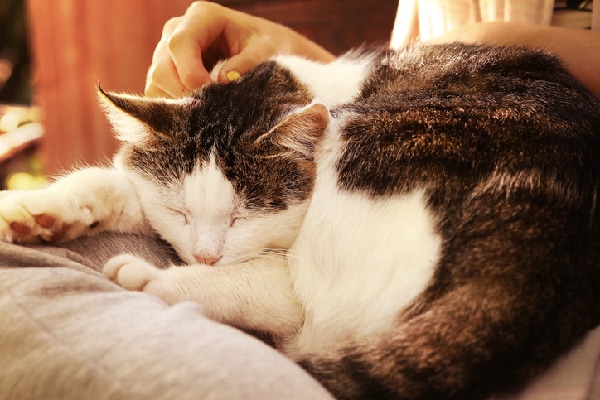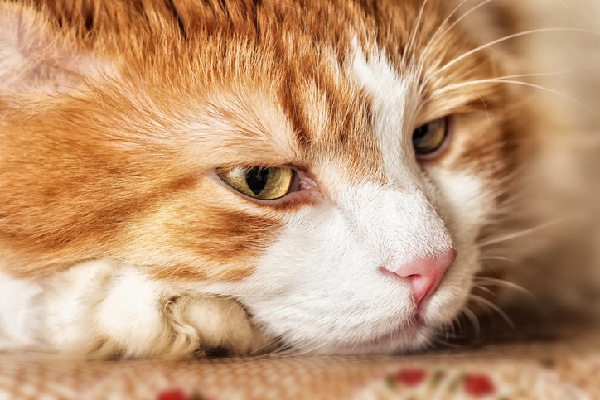Cancer. It’s the diagnosis no pet parent wants to hear. Cancer is a serious disease, but it’s not always a death sentence, especially if you catch the cancer early and seek treatment. Knowing the signs of cancer in cats and things you can do to watch for cancer can literally save your cat’s life. Read on to learn 10 facts about cancer in cats.
The 10 Facts About Cancer in Cats
1. In older cats, the odds of getting cancer are about 50/50.

“It’s estimated that 50 percent of dogs and cats over the age of 10 will have cancer,” says Sue Ettinger, DVM, Dipl. ACVIM (Oncology), of the Veterinary Cancer Center in Norwalk, Connecticut, and co-author of The Dog Cancer Survival Guide. “Cancer is a disease of age so, as in people, the older we get, the greater the chance that we’ll have cancer. One of the problems is that our pets are living longer so we’re seeing more cancer.” However, cancer can affect a cat of any age, even young and middle-aged cats.
2. Cats commonly get certain types of cancer.
According to Dr. Ettinger, the cancers she sees most often in cats are mammary cancer (breast cancer), skin cancer (lumps and bumps) and lymphoma (usually in the intestines). However, there are many different type of cancer, and cats can get other cancers, even very rare ones.
3. Vomiting is NOT normal in cats (and it IS one of the signs of cancer in cats).
Don’t ignore vomiting or brush it off as not a big deal. Vomiting on a regular basis is never normal. “If your pet is vomiting with frequency, mark it down on a calendar because then sometimes it’s easier to look back and see ‘Wow, my cat vomited four time this month,’” Dr. Ettinger says.
4. Different cancers have different symptoms.
Depending on the type of cancer a cat has, you might see vomiting, diarrhea, changes in appetite and weight loss. If you don’t weigh your cat regularly at home on a small scale, it can be hard to tell when your cat is losing weight — especially if your cat is very fluffy.
This is why it’s important to bring your cat to the vet at least on an annual basis so you can check her weight and compare it to her weight on previous visits. “There are other things that can cause vomiting and changes in appetite, whether it’s kidney disease or thyroid disease, which is not uncommon in kitties, so it’s just a good trigger for you to bring your cat to the vet,” Dr. Ettinger explains. According to the American Association of Feline Practitioners, seeking a diagnosis and pursing treatment before your cat’s body condition has significantly deteriorated might positively impact her outcome.
5. Early detection is key to survival when it comes to cancer in cats.
The earlier cancer is discovered, the better your cat’s treatment options are. Check your cat monthly for lumps and bumps, feeling all over her body for anything out of the ordinary. If you find a lump the size of a pea or larger, and it’s still there a month later, it’s time for an immediate vet visit. Since mammary cancer is common in cats, don’t forget to feel the mammary glands on your cat’s tummy (boy cats, too).” Cats have eight mammary glands, so there’s a lot to feel,” Dr. Ettinger says. “You’re basically going to be feeling the entire belly area from their armpit area back to the [hind] leg area.”
6. Some cancers in cats are very treatable.
Some skin cancers can be completely removed with surgery, especially if you catch them when they are small. Even internal cancers can be treated, depending on the type of cancer and how long your cat has had the cancer.
7. Cancer in cats is treated similarly to cancer in people.
Cancer in cats is treated with surgery, chemotherapy and radiation. Depending on the type of cancer and its location, your cat might receive one or any combination of therapies.
8. Chemotherapy usually won’t make your cat sick.
Because chemotherapy is associated with really bad side effects in humans, many pet owners hesitate to try it for their cats. But the reality is, cancer treatment is easier on pets than it is on people. “One of the things that really surprises people when I talk about chemo — because a lot of people are scared of chemo for obvious reasons — but 80 percent of dogs and cats have no side effects from chemotherapy, which is pretty amazing,” Dr. Ettinger says. “Cats have less side effects than dogs and people. Of all the species, cats tolerate chemotherapy the best.”
9. If your vet suspects cancer, certain tests can reveal the issue.
Your vet will do a complete physical exam and blood work and might also want to do an ultrasound of your cat’s abdomen to look inside.
10. Cats can live for many years after a cancer diagnosis.
Depending on the type of cancer, with timely treatment you might have many more years with your cat. “What I think is really important if your pet is diagnosed with cancer is that you go see a cancer specialist. They can break it down for you about that cancer in general and then the specifics going on with your pet,” Dr. Ettinger says.
“Many cancers are treatable and it really depends on the type of cancer. There are some cancers where — with or without treatment — it’s only going to be a couple of months, but there are some cancers that we can potentially cure with surgery,” Dr. Ettinger continues. “There are some that we treat with combinations of maybe surgery and then radiation or chemo, and cats can live one, two, three years, or even longer, depending on the cancer.”
Thumbnail: Photography ©Dashabelozerova | Thinkstock.
Read more about cancer in cats on Catster.com:
- How Can I Help My Cat Who Has Bladder Cancer?
- Can Vaccines Cause Cat Cancer?
- Does Swelling in My Cat’s Face Mean Cancer?
- 1 The 10 Facts About Cancer in Cats
- 1.1 1. In older cats, the odds of getting cancer are about 50/50.
- 1.2 2. Cats commonly get certain types of cancer.
- 1.3 3. Vomiting is NOT normal in cats (and it IS one of the signs of cancer in cats).
- 1.4 4. Different cancers have different symptoms.
- 1.5 5. Early detection is key to survival when it comes to cancer in cats.
- 1.6 6. Some cancers in cats are very treatable.
- 1.7 7. Cancer in cats is treated similarly to cancer in people.
- 1.8 8. Chemotherapy usually won’t make your cat sick.
- 1.9 9. If your vet suspects cancer, certain tests can reveal the issue.
- 1.10 10. Cats can live for many years after a cancer diagnosis.





